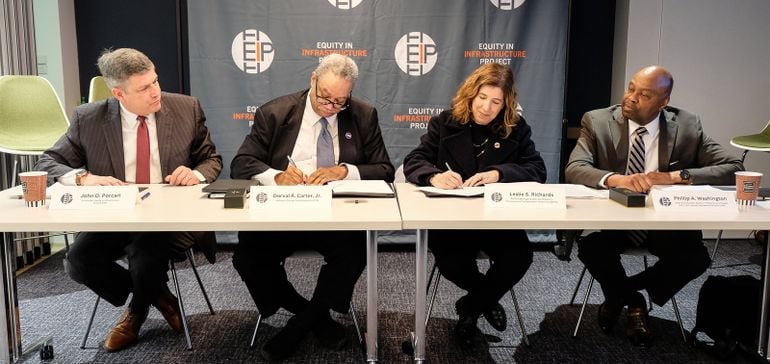The leaders of Chicago and Philadelphia transportation companies signed a singular settlement final week to allow minority-owned contractors to work for each methods with out the necessity for extra certification. The aim is to foster alternatives for small and deprived enterprise enterprises, and to assist companies discover the contractors and subcontractors they should perform tasks, notably for federally funded work.
The reciprocal certification is an effort of the Fairness in Infrastructure Mission, which was based final yr by Denver Worldwide Airport CEO Phillip Washington, former U.S. Deputy Secretary of Transportation John Porcari and others to get state and native companies to rent underrepresented firms, particularly as prime contractors, in order that they’ll share in the advantages of the Infrastructure Funding and Jobs Act.
Underneath the memorandum of understanding, firms that acquire certification as a small enterprise enterprise for both the Southeastern Pennsylvania Transportation Authority or the Chicago Transit Authority may even routinely get hold of it for the opposite company. The hope is that ultimately numerous different public companies will be part of, in impact making a database of eligible SBE and DBE contractors that may shortly plug into work.
EIP additionally goals to advance President Joe Biden’s Justice40 Initiative and govt order that pledge to extend the share of federal contracts that go to small and deprived companies by 2026. Specialists count on that discovering sufficient underrepresented subcontractors will probably be a main problem to implementing IIJA work within the coming yr.
DBEs can compete however want alternatives
Dorval Carter Jr., president of the Chicago Transit Authority, stated on the signing occasion that traditionally underutilized builders want alternatives and assist to flourish and compete. The MOU is meant “to open up new alternatives for the SBEs and DBEs that do enterprise with us in completely new markets, with out having to do a number of new paperwork and different limitations that they might face,” stated Carter.
EIP additionally goals to raise DBEs which have traditionally labored as subcontractors to the contractor degree.
“What we hope will come out of that’s extra alternatives and extra progress for these firms that permits them to grow to be and finally begin to compete at a a lot greater degree inside our trade,” Carter stated.
Most traditionally underutilized companies have restricted workers, so having the ability to work in a distinct jurisdiction with out further paperwork removes a barrier, stated Leslie Richards, normal supervisor of the Southeastern Pennsylvania Transportation Authority, on the signing.
“We do need it to be a nationwide mannequin. We would like others to need to replicate it as a result of we will probably be giving alternatives with the least burden to these traditionally underutilized companies,” stated Richards. “We’re simply thrilled that by way of this settlement we’re laying the inspiration.
